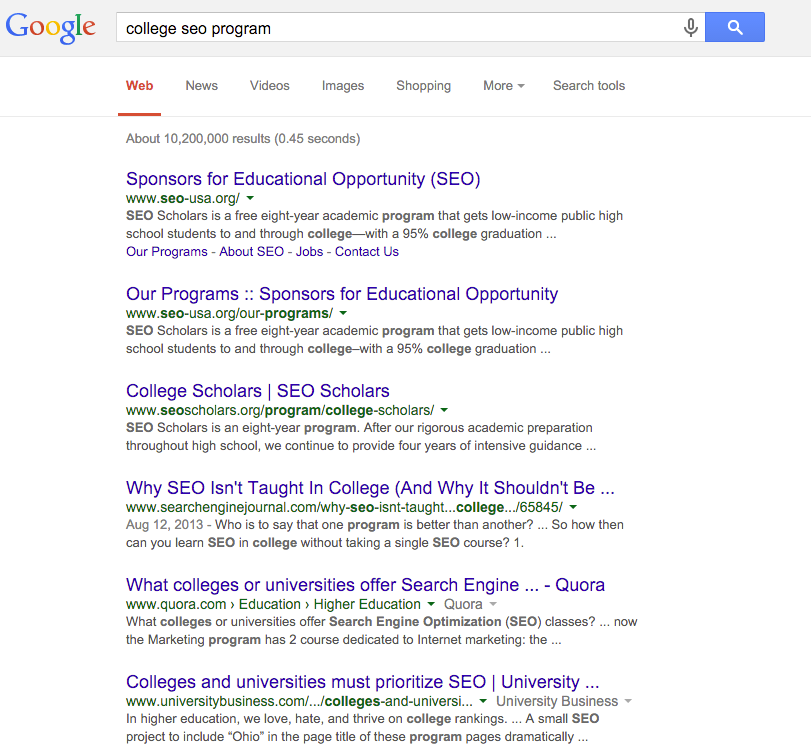
Person I’ve just met: “So, what school did you go to?”
Me: “Layton High School.”
Person I’ve just met: “No, I mean college. What college did you go to?”
Me: “Oh, no, I haven’t gone to college.”
Person I’ve just met: “Oh. I see. So do you work?”
Me: “Yeah, I’m a freelancer and consultant full time. What about you?”
Person I’ve just met: “No college and no job? Wow, why not? And how do you do it?”
Why Haven’t You Gone to College?
I run into this situation more often than I’d like to admit. The conversation doesn’t always go like that to the T, but it always seems to end up on the same note. I feel like this deserves a blog post, so here it goes.
Let’s do a simple Google search for “college SEO program” and see what comes up. Here, I’ll make it easy:
https://www.google.com/search?q=college+seo+program
The first three listings are related to “Sponsors for Educational Opportunity.” Another good one is “Student Employment Office.” Because apparently in the higher education world, that’s what SEO means. Other listings on the page talk about why SEO should or shouldn’t be taught in college, or are related to SEO strategies for colleges and universities.
Didn’t click the link? I’ll make it even easier for you.

Now that we’re all on the same page, I’d like to point something out. There’s not a single program here that actually teaches SEO. I’ve heard of some schools that offer classes on SEO, or industry professionals who teach extra-curricular classes on the basic principles on online marketing. But not once have I seen a curriculum that is dedicated to SEO, and I don’t think I should.
Maintaining an SEO Program is Just Too Difficult
Let’s say someone puts a course dedicated to SEO together. They spend thousands of hours writing a text book, putting the curriculum in place, creating assignments, working out deals with software companies to make the class affordable, and actually getting people to enroll in the class.
Assuming they get this far, class can actually start. As the class goes along, tweaks and adjustments will probably need to be made to ensure the class is getting the full benefit. Let’s assume that it only takes one semester for the teacher to get most of the bugs worked out. The next semester, search engines have made a change to the way they operate and some of the curriculum becomes outdated. Rather than update it, though, this teacher may leave the information outdated, because they just streamlined their teaching process.
12 months down the road, the curriculum becomes outdated. Technology has changed, people are searching in different ways, and the curriculum was never designed to teach about app indexing, Apple’s improved Spotlight search, or how search engines handle new top level domains. So now what? Dump the existing course and start over fresh? Put another few thousand hours into a fresh text book and course where you’ve got more bugs and kinks to work out?
I don’t see how it would work. The technology just moves too quickly.
So What About Adjacent Programs?
Well, the answer to that is simple. I believe advertising programs are becoming less relevant. Web design isn’t something I need any more knowledge of (apart from keeping on top of design trends and best practices, which I can find online). And programming/development would be an all-consuming thing. If I were going to be a developer, that’s the only thing I’d be able to focus on.
What About a Degree Just to Have a Degree?
I’ve heard in job interviews for online marketing positions things like “I don’t really care what your degree is in, but if I had to choose between two otherwise equal candidates, but one has a degree and the other doesn’t, I’ll pick the one with the degree,” or “A degree mostly shows me that you can stick with something for an extended period of time.”
I’ll be as tactful as I can in response to that one. Statements like those are huge red flags to me. I interpret them as “I care more about appearances than I care about finding the best fit for the position or the most qualified candidate.” I have no interest in working with or for someone like that. I realize this limits the number of people I might be able to work with, but I think it means the people I do work with have a much greater chance of succeeding.
If you have any thoughts you’d like to share or feel like I’ve missed anything, I’m more than open to hearing it all. Get at me in the comments and let’s start a discussion!

